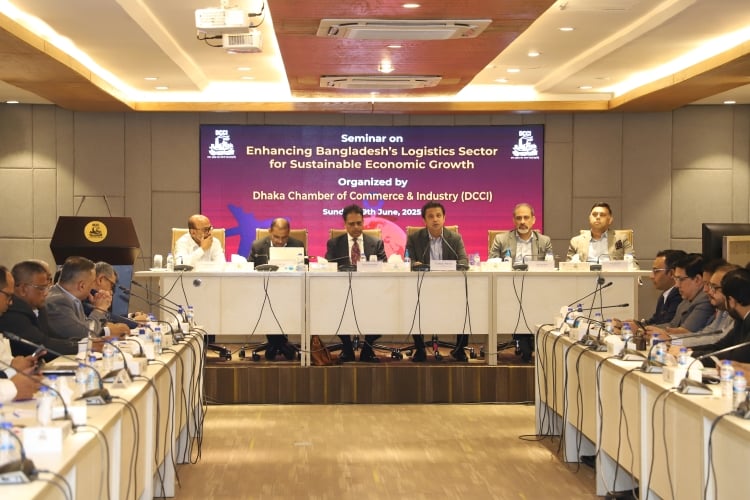News Flash
News Flash

DHAKA, June 29, 2025 (BSS) - Dr. Sheik Moinuddin, Special Assistant to the Chief Adviser (Rank of State Minister), Ministry of Road Transport and Bridges, today stressed on a multimodal transportation ecosystem consisting of road, rail, river, air, sea including information super highway.
He said this ecosystem should be aimed at increasing the country’s competitive ability in global trade after the post-LDC era. “Otherwise our economy will face a big challenge,” he said.
The Chief Adviser’s Special Assistant was addressing a seminar organized by the Dhaka Chamber of Commerce & Industry (DCCI) on “Enhancing Bangladesh’s Logistic Sector for Sustainable Economic Growth” as the chief guest held at the DCCI auditorium in the capital.
Dr Moinuddin said that one of the main hindrances to the development of logistics sector is that the country does not have any bigger and long-term master plan.
He informed that the government is working towards an integrated transport system suitable for the next 25-50 years and urged the private sector to come forward in this regard.
Md. Salim Ullah, Chairman, Bangladesh Inland Water Transport Corporation (BIWTC) said the government has already formed a committee to re-visit the recently formulated logistics policy.
He also informed that BIWTA has taken an initiative to prepare a master plan soon for the development of inland water transport logistic system in the country.
DCCI President Taskeen Ahmed said that to improve in the export, import sector in this new era, reducing logistics cost and enhancing efficiency would be critical to compete in the international market.
Right now, Bangladesh ranks 88th out of 139 countries in the Logistics Performance Index 2023. Port congestion, customs delays, and fragmented infrastructure continue to push up logistics cost, estimated to be 15-20% of GDP, far above the global average of 8-10%, he added.
Taskeen Ahmed also said that ports are the lifeline of the country’s trade. “Chattogram and Mongla ports alone handle 92% of our international trade, contributing nearly 30% of our GDP. Upgrading these with container scanners, off-dock automation, AI-driven traffic management, and flexible port charges is essential,” he said.
He also suggested for connecting shippers and transporters through digital platform, deploying warehouse management system (WMS), robotics and cold-chain logistics to boost operational efficiency and seamless connection of road, rail, river and sea transportation system.
Later, he said that platforms like ASYCUDA and the National Single Window should be expanded and integrated to eliminate bureaucratic delays, reduce corruption and ensure faster cross-border movement of goods.
The DCCI President Taskeen Ahmed also called for providing necessary policy support and financial incentives to involve the private sector in the development of ICDs.
Dr. M. Masrur Reaz, Chairman and CEO, Policy Exchange Bangladesh in his keynote presentation said that in the last few decades Bangladesh has set an example in the global arena through its commendable economic progress but it was mainly dependent on a single export item that is RMG which is contributing almost 82% to our total export earnings.
“We actually failed to diversify our exportable products as well as find new export destinations that basically hover around EU, the UK and the USA based market destinations,” he added.
Highlighting the importance of logistics, he mentioned that it is possible to increase export by about 20% if only 25% of the logistics cost can be reduced, and 7.4% export can be enhanced if the transportation cost can be reduced by 1%.
Abul Kasem Khan, Chairperson, Business Initiative Leading Development (BUILD) said as far as the development of logistics sector is concerned, Bangladesh lags behind a lot and is still in the same place where it was earlier.
He said the infrastructure and logistics sector alone needs an investment of 8-10% of GDP or about $20 billion every year to achieve the desired development goals.
He pointed out that at present, Bangladesh can merely attract $1 to $1.5 billion FDI in the country, but the infrastructure and logistics sector can attract a huge amount of FDI like other countries do have.
Kasem also said that it is necessary to take up a holistic master plan to create a sustainable and reliable infrastructure for the next 50 years.
Md. Habibur Rahman, Additional Secretary, Member (Admin and Planning), Chittagong Port Authority (CPA) said the capacity of the country's seaports will reach to about 10 million TEUs by 2030, but to ensure its use, the private sector will have to increase the import-export activities manifold otherwise it will remain underutilized.
Alamgir Morshed, Executive Director & CEO, Infrastructure Development Company Limited (IDCOL) stated that long-term financing remains a major bottleneck for developing logistics infrastructure in the country.
Shamim Ul Huq, Country Director, DP World, Bangladesh said that digitalization should be utilized to enhance the productivity of warehouses.
Humayun Kabir, Senior Project Officer (Transport), Transport Sector Office, Asian Development Bank (ADB) said that in order to implement Bangladesh’s logistics policy, ADB is keen to provide necessary technical support and currently they are working closely with the government towards this goal.
Mohammad Naquib Uddin Khan, President of Bangladesh Supply Chain Management Society stated that -- to increase reliability in the logistics sector, reducing costs and lead time, as well as enhancing speed -- are essential.
Rear Admiral (retd) M Khaled Iqbal, former Chairman, Chittagong Port Authority, Abdul Haque, President of BARVIDA, Osama Taseer, former President of DCCI, M. Abu Horairah, former Vice President of DCCI, A.K.D. Khair Mohammad Khan, former Director of DCCI and Abrarul Alam, Convener of DCCI’s Standing Committee also spoke on the occasion.
The discussants emphasized the need to establish more compliant Inland Container Depots (ICDs), led by the private sector, increase dredging activities to improve river navigability, boost port-led economic activities, and strengthen inter-agency coordination among government bodies.
DCCI Senior Vice President Razeev H Chowdhury and Vice President Md. Salem Sulaiman were present, among others, at the seminar.